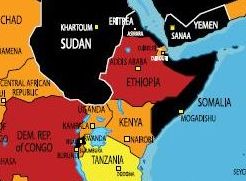 Iran and the People´s Republic of China, with 34 imprisoned journalists apiece, are the world’s worst jailers of the press, together constituting nearly half of the worldwide total. The figures for these countries have to be seen in relation to their vast populations and large numbers of media outlets, though. Eritrea, Burma, and Uzbekistan round out the five worst jailers from among the 28 nations that imprison journalists.
Iran and the People´s Republic of China, with 34 imprisoned journalists apiece, are the world’s worst jailers of the press, together constituting nearly half of the worldwide total. The figures for these countries have to be seen in relation to their vast populations and large numbers of media outlets, though. Eritrea, Burma, and Uzbekistan round out the five worst jailers from among the 28 nations that imprison journalists.
Eritrea – nr 3 in the world
Despite it’s tiny population of no more than about five million people, and very limited number of media outlets, too, Eritrea is the world’s third-worst jailer in 2010. Eleven of the Eritrean detainees have been held in secret locations without charge for a decade. The Eritrean government has refused to disclose any information about these 11 detainees, who were swept up in a brutal shutdown of the last remaining parts of the independent press. Since then, there has been no independent media, and no freedom of expression in the country.
Unconfirmed reports have said four of the journalists jailed in Eritrea may have died due to mistreatment in custody. CPJ is seeking to corroborate those reports and continues to list the journalists in its 2010 census as a means of holding the government responsible for their fates.
 Ethiopia holds 4 journalists in it’s prisons , Sudan – 3, and Burundi – 1. Find out more about each country here. The numbers for imprisoned journalists should be seen in relation to the numbers of journalists killed, which is also high in East and Horn of Africa, with Somalia on top, having lost more than 20 journalists in the last three years. Threats and intimidation against journalists in Uganda are also a commonplace.
Ethiopia holds 4 journalists in it’s prisons , Sudan – 3, and Burundi – 1. Find out more about each country here. The numbers for imprisoned journalists should be seen in relation to the numbers of journalists killed, which is also high in East and Horn of Africa, with Somalia on top, having lost more than 20 journalists in the last three years. Threats and intimidation against journalists in Uganda are also a commonplace.
According to the 2010 World Press Freedom Index made by Reporters Without Borders, the East and Horn of Africa continues to be the region with the least press freedom.
Journalists jailed systematically
“The increase in the number of journalists jailed around the world is a shocking development,” said CPJ Executive Director Joel Simon. “It is fueled largely by a small handful of countries that systematically jail journalists – countries that are at war with information itself.”
According to him, the legal justification for jailing journalists varies from country to country, but the motivation is nearly always the same: to crush those who challenge the authority of the state.
Increase in numbers
This year there is an increase of nine imprisoned journalists (from 136 to 145) from the 2009 tally, CPJ says. The increase reflected in the 2010 census comes despite the release of 17 Cuban journalists who had been held on antistate charges since a 2003 government crackdown on dissent.
Journalists who either disappear or are abducted by nonstate entities such as criminal gangs or militant groups are not included on the prison census. Their cases are classified as “missing” or “abducted.”
The list does not include the many journalists imprisone d and released throughout the year. Journalists remain on CPJ’s list until the organization determines with reasonable certainty that they have been released or have died in custody.
d and released throughout the year. Journalists remain on CPJ’s list until the organization determines with reasonable certainty that they have been released or have died in custody.
At least one journalist died in prison in 2010 in Cameroon.
Related links:
The freedom of press in East and Horn of Africa remains worst in the world
Eritrea – no freedom of expression
Somali journalist killed in Mogadishu fighting
Somalia: civilians face ongoing human rights violations
The least free places on Earth: 2010
Human Rights Network Uganda concerned about oppression of the media


